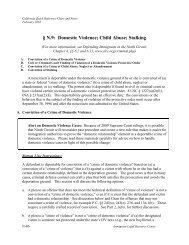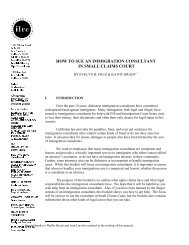Inspiring Leadership in Immigrant Communities - ILRC
Inspiring Leadership in Immigrant Communities - ILRC
Inspiring Leadership in Immigrant Communities - ILRC
- No tags were found...
Create successful ePaper yourself
Turn your PDF publications into a flip-book with our unique Google optimized e-Paper software.
<strong>Inspir<strong>in</strong>g</strong> <strong>Leadership</strong> <strong>in</strong> <strong>Immigrant</strong> <strong>Communities</strong>January 20034. Always take the name of the person with whom you speak. It is very likelythat you'll need this <strong>in</strong> later negotiations.5. Be well prepared for meet<strong>in</strong>gs.Be prepared to prove your whole case from the beg<strong>in</strong>n<strong>in</strong>g. Br<strong>in</strong>g:• an organized file with copies of all documents related to the issue;• notes on the history of the issue, <strong>in</strong>clud<strong>in</strong>g the dates of important actions;• notes on what you want to say dur<strong>in</strong>g the negotiation;• a notepad to take notes dur<strong>in</strong>g the negotiation;• if the client is a negotiator, she may br<strong>in</strong>g a friend to translate or providemoral support. The friend might not be allowed <strong>in</strong> to the actual meet<strong>in</strong>g, butshe might be allowed to attend.If possible, talk to other people about the people with whom you are go<strong>in</strong>g tonegotiate. F<strong>in</strong>d out who responds to sympathetic stories and who responds to threats.Share stories of what works with different people with whom you might negotiate.6. Know what you or the person you are assist<strong>in</strong>g wants. Be prepared tocompromise.Figure out what you (or the person you are assist<strong>in</strong>g) want from the negotiation.Make sure you know all your options. Explore any other alternatives that might fulfillwhat you or the people you are help<strong>in</strong>g want. Understand what compromises your sidemight agree to and what compromises the other side might agree to.7. Organize with others.Governmental agencies, landlords, schools, and others, often pay more attentionto a group than an <strong>in</strong>dividual. Coalitions of agencies (or agencies and attorneys) can getmore benefits for the community member than they can work alone. They can "speakwith one voice" to the other side, as well as to the media, local government, andCongressional representatives. They can request official meet<strong>in</strong>gs, where they can try tosolve problems on a policy level <strong>in</strong>stead of just <strong>in</strong>dividual cases. You may form acoalition to deal with just one problem -- such as abuses <strong>in</strong> INS raids -- or to deal withproblems on an ongo<strong>in</strong>g basis. Many exist<strong>in</strong>g coalitions or other groups are will<strong>in</strong>g toadvise people who are form<strong>in</strong>g a group.Negotiation Strategies1. Be prepared to make a legal argument <strong>in</strong> case you have to. Br<strong>in</strong>g legalauthority and support<strong>in</strong>g documents.Part of negotiat<strong>in</strong>g can <strong>in</strong>clude mak<strong>in</strong>g a legal argument to the other side. Youmay need to br<strong>in</strong>g a lawyer or paralegal with you to the negotiation, or you may need toApp.7-A-3
















